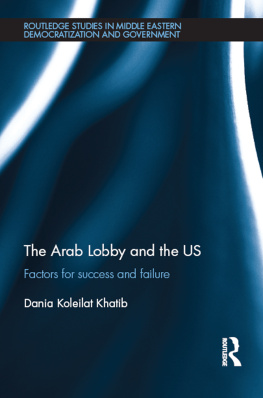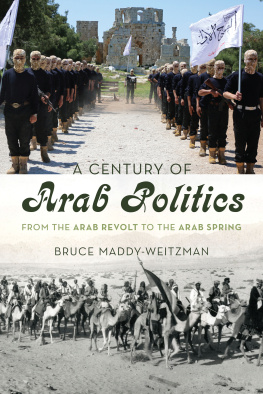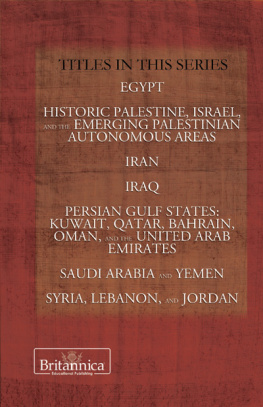The Arab Lobby and the US
All the components needed to construct an Arab lobby exist: the significant Arab Diaspora in the US, the historic strategic relationship between Arab Gulf States and the US, and the Gulfs economic wealth. However, lobbying is alien to Arab culture and largely absent from its political landscape. To achieve a fair and objective assessment of Arab Gulf lobbying it is necessary to have a thorough understanding of its patterns and cultural background, in the context of the US political system.
The Arab Lobby and the US provides a timely contribution to this understanding. Studying attempts by Arab Gulf states to effectively lobby the US government, it explores aspects of their lobbying behavior in order to identify the factors that lead to success and those that lead to failure from their lobbying endeavors. In this respect, the research utilizes two case studies: one in which Arab Gulf state lobbying was successful, and another in which lobbying failed. In tandem with an analysis of the strategiesor lack of thembehind Arab Gulf states lobbying, the research examines additional relevant factors such as the organization and activism of the US Arab American community, the strategic value of the Arab Gulf to the US, and the negative image of Arabs in America. The book considers the obstacles to the establishment of an effective Arab Gulf lobby in the US in order to reach an informed conclusion that evaluates the prospects of an effective Arab Gulf lobby.
As one of the few academic research works on the Arab Lobby, this work will be of value to scholars and policy makers interested in US domestic politics and Arab American activism, as well as students of Middle Eastern Studies, Arab Gulf studies and communication and public relations, among others.
Dania Koleilat Khatib obtained her doctorate in politics from the University of Exeter, following a career in marketing and public relations. She is also a contributor on politics to publications in the Arab Gulf.
Routledge Studies in Middle Eastern Democratization and Government
Edited by Larbi Sadiki
Qatar University
This series examines new ways of understanding democratization and government in the Middle East. The varied and uneven processes of change, occurring in the Middle Eastern region, can no longer be read and interpreted solely through the prism of Euro-American transitology. Seeking to frame critical parameters in light of these new horizons, this series instigates reinterpretations of democracy and propagates formerly subaltern, narratives of democratization. Reinvigorating discussion on how Arab and Middle Eastern peoples and societies seek good government, Routledge Studies in Middle Eastern Democratization and Government provide tests and contests of old and new assumptions.
1 Revolution, Revolt and Reform in North Africa
The Arab Spring and beyond
Edited by Ricardo Ren Larmont
2 Informal Power in the Greater Middle East
Hidden geographies
Edited by Luca Anceschi, Gennaro Gervasio and Andrea Teti
3 Crowds and Politics in North Africa
Tunisia, Algeria and Libya
Andrea Khalil
4 Egypts Long Revolution
Protest movements and uprisings
Maha Abdelrahman
5 Sectarianism in Iraq
The making of state and nation since 1920
Khalil F. Osman
6 Sufism and Politics in Morocco
Activism and dissent
Abdelilah Bouasria
7 Political and Constitutional Transitions in North Africa
Actors and factors
Justin O. Frosini and Francesco Biagi
8 Al Jazeera and Democratization
The rise of the Arab public sphere
Ezzeddine Abdelmoula
9 Revolutionary Egypt
Connecting domestic and international struggles
Edited by Reem Abou-El-Fadl
10 Oil States in the New Middle East
Uprisings and stability
Edited by Kjetil Selvik and Bjrn Olav Utvik
11 Politics of the Islamic Tradition
The thought of Muhammad al-Ghazali
Mohammed Moussa
12 The Arab Lobby and the US
Factors for success and failure
Dania Koleilat Khatib
The Arab Lobby and the US
Factors for success and failure
Dania Koleilat Khatib
First published 2016
by Routledge
2 Park Square, Milton Park, Abingdon, Oxon OX14 4RN
and by Routledge
711 Third Avenue, New York, NY 10017
Routledge is an imprint of the Taylor & Francis Group, an informa business
2016 Dania Koleilat Khatib
The right of Dania Koleilat Khatib to be identified as author of this work has been asserted by her in accordance with sections 77 and 78 of the Copyright, Designs and Patents Act 1988.
All rights reserved. No part of this book may be reprinted or reproduced or utilized in any form or by any electronic, mechanical, or other means, now known or hereafter invented, including photocopying and recording, or in any information storage or retrieval system, without permission in writing from the publishers.
Trademark notice: Product or corporate names may be trademarks or registered trademarks, and are used only for identification and explanation without intent to infringe.
British Library Cataloguing-in-Publication Data
A catalogue record for this book is available from the British Library
Library of Congress Cataloging-in-Publication Data
Khatib, Dania Koleilat, author.
The Arab lobby and the US : factors for success and failure /
Dania Koleilat Khatib.
pages cm. (Routledge studies in Middle Eastern democratization and government)
Includes bibliographical references.
1. United StatesForeign relationsPersian Gulf Region. 2. Persian Gulf RegionForeign relationsUnited States. 3. LobbyingUnited States. 4. ArabsPolitical activityUnited States. I. Title. II. Title: Arab lobby and the United States.
DS326.K458 2016
327.11dc23
2015019458
ISBN: 978-1-138-93262-3 (hbk)
ISBN: 978-1-315-67915-0 (ebk)
Typeset in Times New Roman
by Wearset Ltd, Boldon, Tyne and Wear
Contents
I decided to embark on writing a book in order to research a phenomenon that for Arabs almost represents a mystery: lobbying. The question that intrigued me for years is why there is no Arab lobby despite the existence of all the components that are needed to construct one: the existence of a significant Arab Diaspora in the US, the historic strategic relationship between Arab Gulf States and the US, and the Gulfs economic wealth.
Though public discourse brings up here and there the idea of the absence of an effective long-term lobby that can influence US foreign policy (Mahmoud, 2003; Hishmeh, 2009; Rahman, 2011; Syed, 2011), no previous work has approached it in a scientific and systematic manner. The different materials I examined reflected cynicism about the state of Arabs and their inability to come to a collective action. Another category of works signaled the need to have a lobby, without describing how to go about creating one or what a lobby should look like. But none of the works answered my questions. I wanted to conduct this research in order to shed light on a very important aspect of American politics, an aspect that Arabs generally look upon as a cabal or as a conspiracy to manipulate and which we try to stay away from, whereas in fact lobbying is a constitutional right. We have this view of lobbying because we do not understand it, it is alien to our culture and our mentality, and this fact puts the entire research into perspective. One respondent I interviewed for my book, a former American ambassador to an Arab Gulf state, said: You need a change in mentality. The Arab Gulf views American politics from its own perspective, which is shaped by the way the Arab Gulf States conduct their politics. The concept of representation that exists in American politics and on which lobbying is based does not exist in the Arab Gulf. Although traditionally the tribes, as well as individual subjects, plead to the ruler, this has not taken an institutionalized form as in the US.











